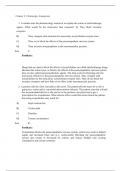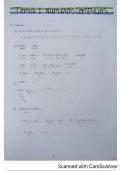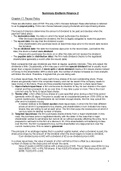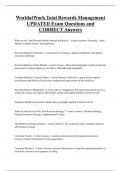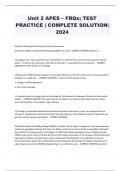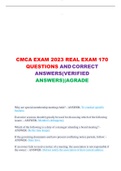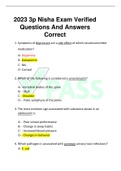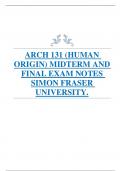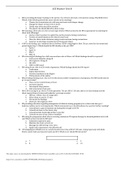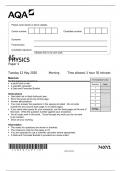Chapter 5: Cholinergic Antagonists
1. A student asks the pharmacology instructor to explain the action of anticholinergic
agents. What would be the instructors best response? A) They block nicotinic
receptors.
B) They compete with serotonin for muscarinic acetylcholine receptor sites.
C) They act to block the effects of the parasympathetic nervous system.
D) They increase norepinephrine at the neuromuscular junction.
Ans: C
Feedback:
Drugs that are used to block the effects of acetylcholine are called anticholinergic drugs.
Because this action lyses, or blocks, the effects of the parasympathetic nervous system,
they are also called parasympatholytic agents. The drug works by blocking only the
muscarinic effectors in the parasympathetic nervous system. They compete with
acetylcholine for the muscarinic acetylcholine receptor sites. They do not block the
nicotinic receptors and have little or no effect at the neuromuscular junction.
2. A patient calls the clinic and talks to the nurse. The patient tells the nurse he or she is
going on a cruise and is concerned about motion sickness. The patient says that a friend
has recommended that he or she see his or her primary care physician to get a
prescription for scopolamine. What adverse effect would the nurse inform the patient
that using scopolamine may result in?
A) Pupil constriction
B) Tachycardia
C) Diarrhea
D) Urinary incontinence
Ans: B
Feedback:
Scopolamine blocks the parasympathetic nervous system, which may result in dilated
pupils and increased heart rate (i.e., tachycardia). Blocking the parasympathetic
system also results in decreased GI activity and urinary bladder tone causing
constipation and urinary retention.
, 3. A 29-year-old man is going on a company-sponsored deep-sea fishing trip in 2 weeks. He
comes to the clinic requesting a scopolamine patch because he is afraid that he will get
seasick. The medication is prescribed for him and the nurses instructions concerning use
of the patch will include what?
A) Shave the area before applying the patch.
B) The patchs effectiveness will last about 72 hours.
C) When replacing the patch, apply the new patch in the same area.
D) Do not clean the application area before applying the patch.
Ans: B
Feedback:
The scopolamine patch is replaced every 3 days (i.e., 72 hours). The scopolamine patch
should be applied to a clean, dry, intact, and hairless area of the body. The area should
not be shaved because abrasion of the skin could occur and lead to increased absorption.
Patches should be placed at new sites each time to avoid skin irritation. The old patch
should be removed and the area cleaned.
4. The nurse is taking a health history on a new patient who has been prescribed
propantheline(generic) as adjunctive therapy for peptic ulcers. While collecting the
health history, what will the nurse specifically assess for?
A) Diabetes mellitus
B) Obsessive-compulsive disorder
C) Insomnia
D) Glaucoma
Ans: D
Feedback:
Propantheline is contraindicated for a patient with glaucoma because the drug could
result in increased intraocular pressure due to pupil dilation. Diabetes mellitus,
obsessive- compulsive disorder, and insomnia are not recognized as being adversely
affected by this drug.
5. A nurse is admitting a patient for outpatient eye surgery. The nurse routinely
administers preoperative medications for eye surgery and is aware that an increased
dosage of a mydriatic is likely when given to a member of what ethnic group?
A) African Americans
B) German Americans
, C) Irish Americans
D) Scandinavian Americans
Ans: A
Feedback:
African Americans with dark eyes usually require an increased dosage and may have a
prolonged time to peak effect. The need for an increased dose appears to be related to the
amount of pigment in the persons eyes because people with darker-pigmented eyes
require a higher dose. German, Irish, and Scandinavian Americans generally have less
pigmentation in their eyes and are therefore less likely to need a greater dose.
6. A patient has been newly diagnosed with irritable bowel syndrome (IBS). The nurse
knows that the most likely choice of anticholinergic drug to be prescribed for this
patient is what?
A) Atropine (generic)
B) Dicyclomine (generic)
C) Glycopyrrolate (Robinul) D) Methscopolamine (Pamine) Ans: B
Feedback:
Dicyclomine is the most likely choice of anticholinergic drug for IBS. It relaxes the GI
tract and is a frequent choice in the treatment of hyperactive bowel and IBS. Atropine is
used to decrease secretions, for bradycardia, pylorospasm, ureteral colic, relaxing the
bladder, pupil dilation, and as an antidote for cholinergic drugs. Glycopyrrolate is used to
decrease secretions and as an antidote for neuromuscular blockers. Methscopolamine is
used as adjunctive therapy for ulcers.
7. A patient has come to the clinic for a follow-up visit. He or she has been taking
glycopyrrolate (Robinul) for adjunctive management of his or her peptic ulcer disease
for 1 year. What would the nurse question this patient about?
A) Diarrhea
B) Oral discomfort
C) Headaches
D) Dyspnea
Ans: B
Feedback:
1. A student asks the pharmacology instructor to explain the action of anticholinergic
agents. What would be the instructors best response? A) They block nicotinic
receptors.
B) They compete with serotonin for muscarinic acetylcholine receptor sites.
C) They act to block the effects of the parasympathetic nervous system.
D) They increase norepinephrine at the neuromuscular junction.
Ans: C
Feedback:
Drugs that are used to block the effects of acetylcholine are called anticholinergic drugs.
Because this action lyses, or blocks, the effects of the parasympathetic nervous system,
they are also called parasympatholytic agents. The drug works by blocking only the
muscarinic effectors in the parasympathetic nervous system. They compete with
acetylcholine for the muscarinic acetylcholine receptor sites. They do not block the
nicotinic receptors and have little or no effect at the neuromuscular junction.
2. A patient calls the clinic and talks to the nurse. The patient tells the nurse he or she is
going on a cruise and is concerned about motion sickness. The patient says that a friend
has recommended that he or she see his or her primary care physician to get a
prescription for scopolamine. What adverse effect would the nurse inform the patient
that using scopolamine may result in?
A) Pupil constriction
B) Tachycardia
C) Diarrhea
D) Urinary incontinence
Ans: B
Feedback:
Scopolamine blocks the parasympathetic nervous system, which may result in dilated
pupils and increased heart rate (i.e., tachycardia). Blocking the parasympathetic
system also results in decreased GI activity and urinary bladder tone causing
constipation and urinary retention.
, 3. A 29-year-old man is going on a company-sponsored deep-sea fishing trip in 2 weeks. He
comes to the clinic requesting a scopolamine patch because he is afraid that he will get
seasick. The medication is prescribed for him and the nurses instructions concerning use
of the patch will include what?
A) Shave the area before applying the patch.
B) The patchs effectiveness will last about 72 hours.
C) When replacing the patch, apply the new patch in the same area.
D) Do not clean the application area before applying the patch.
Ans: B
Feedback:
The scopolamine patch is replaced every 3 days (i.e., 72 hours). The scopolamine patch
should be applied to a clean, dry, intact, and hairless area of the body. The area should
not be shaved because abrasion of the skin could occur and lead to increased absorption.
Patches should be placed at new sites each time to avoid skin irritation. The old patch
should be removed and the area cleaned.
4. The nurse is taking a health history on a new patient who has been prescribed
propantheline(generic) as adjunctive therapy for peptic ulcers. While collecting the
health history, what will the nurse specifically assess for?
A) Diabetes mellitus
B) Obsessive-compulsive disorder
C) Insomnia
D) Glaucoma
Ans: D
Feedback:
Propantheline is contraindicated for a patient with glaucoma because the drug could
result in increased intraocular pressure due to pupil dilation. Diabetes mellitus,
obsessive- compulsive disorder, and insomnia are not recognized as being adversely
affected by this drug.
5. A nurse is admitting a patient for outpatient eye surgery. The nurse routinely
administers preoperative medications for eye surgery and is aware that an increased
dosage of a mydriatic is likely when given to a member of what ethnic group?
A) African Americans
B) German Americans
, C) Irish Americans
D) Scandinavian Americans
Ans: A
Feedback:
African Americans with dark eyes usually require an increased dosage and may have a
prolonged time to peak effect. The need for an increased dose appears to be related to the
amount of pigment in the persons eyes because people with darker-pigmented eyes
require a higher dose. German, Irish, and Scandinavian Americans generally have less
pigmentation in their eyes and are therefore less likely to need a greater dose.
6. A patient has been newly diagnosed with irritable bowel syndrome (IBS). The nurse
knows that the most likely choice of anticholinergic drug to be prescribed for this
patient is what?
A) Atropine (generic)
B) Dicyclomine (generic)
C) Glycopyrrolate (Robinul) D) Methscopolamine (Pamine) Ans: B
Feedback:
Dicyclomine is the most likely choice of anticholinergic drug for IBS. It relaxes the GI
tract and is a frequent choice in the treatment of hyperactive bowel and IBS. Atropine is
used to decrease secretions, for bradycardia, pylorospasm, ureteral colic, relaxing the
bladder, pupil dilation, and as an antidote for cholinergic drugs. Glycopyrrolate is used to
decrease secretions and as an antidote for neuromuscular blockers. Methscopolamine is
used as adjunctive therapy for ulcers.
7. A patient has come to the clinic for a follow-up visit. He or she has been taking
glycopyrrolate (Robinul) for adjunctive management of his or her peptic ulcer disease
for 1 year. What would the nurse question this patient about?
A) Diarrhea
B) Oral discomfort
C) Headaches
D) Dyspnea
Ans: B
Feedback:

